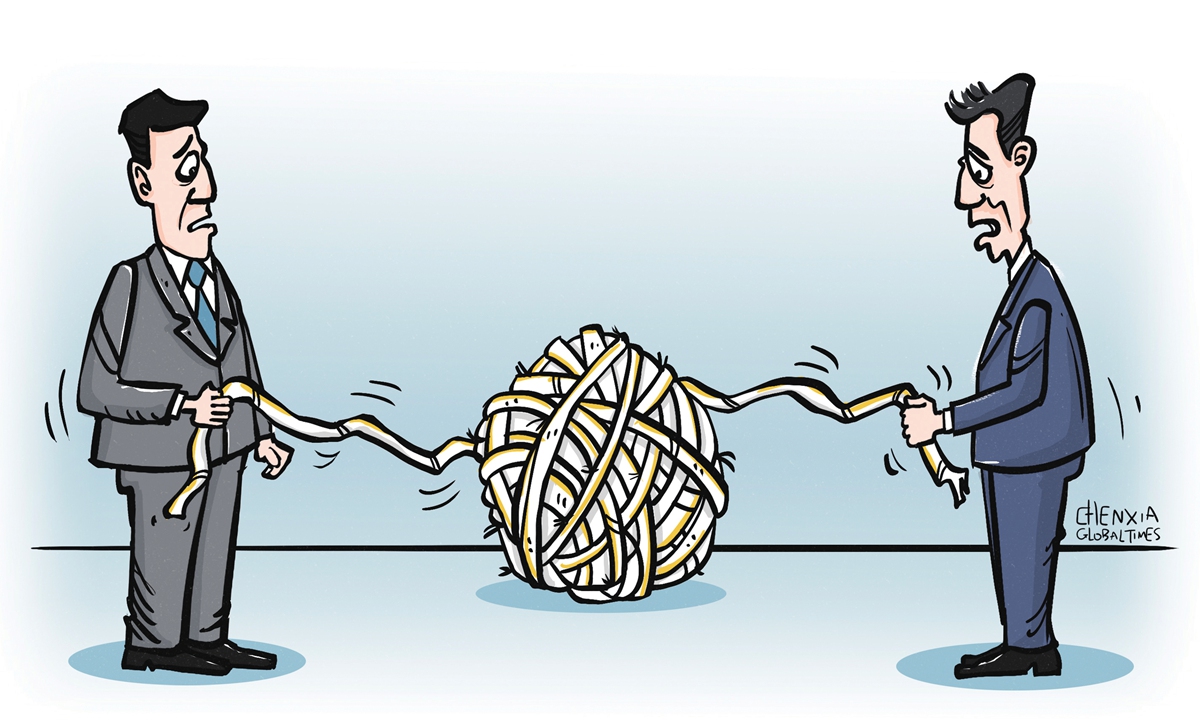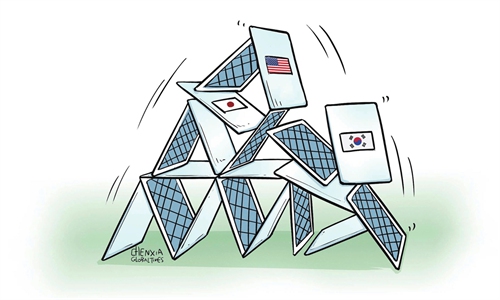
Illustration: Chen Xia/GT
Recently, Japan's frequent "protests," "regrets," and even "criticism" toward South Korea have once again attracted attention in South Korea and the international community. The historical grievances between Japan and South Korea have resurfaced and intensified.From South Korea's Supreme Court in January ruling that a Japanese company should compensate victims of forced labor during World War II, which was protested by the Japanese government, to the Japanese Foreign Minister expressing strong regret over this issue to her South Korean counterpart during a February meeting of foreign ministers from G20 countries, Tokyo has been uncompromising on the historical issues with Seoul.
On the other hand, South Korean President Yoon Suk-yeol did not mention Japan's colonial rule history in his speech commemorating the March . In comparison, the Yoon administration's strong push for improving relations with Japan seems a bit too enthusiastic. Japan hit back with an unfair demand on these historical disputes, further highlighting that even though relations between the two countries are improving, it is difficult to expect arrogant Japan to apologize for its colonial behaviors in history.
China, which has also suffered from Japanese militarist aggression, sympathizes deeply with the demands from various sectors in South Korea for Japan to apologize and compensate. During a routine press conference on February 29, Chinese Foreign Ministry spokesperson Mao Ning stated that the forced recruitment and enslavement of laborers is a grave crime against humanitarian law committed by Japanese militarism during its aggression and colonial rule against the people of Asian nations, including those of China and South Korea. The facts are backed by ironclad evidence and shall not be denied or altered.
China has long called for the Japanese government to properly handle relevant issues left over from history with an honest and responsible attitude, said Mao. Japan needs to face squarely and reflect on that part of history, and show remorse for its past crimes and respect for the victims through concrete actions. Japan also needs to shape a correct view of history among the younger generation. Only by doing so can Japan truly earn the trust of its Asian neighbors and the wider international community, the spokesperson said.
In the relationship between Japan and South Korea, historical disputes are as sensitive and complex as territorial issues. "Comfort women" and "forced labor" are the two major constraints in the development history between the two countries. Both issues have evolved into a prolonged diplomatic dispute between the two due to Japan's lack of sincerity and deep reflection on its historical crimes.
In terms of the "comfort women" issue, in 2015, Japan and South Korea reached an agreement on this matter, confirming that the issue had been "finally and irreversibly" resolved. However, the subsequent development of events took decision-makers of both countries by surprise. The agreement sparked domestic criticism in both nations, and events such as the controversy over a comfort women statue in South Korea in 2017 became a turning point, leading to a diplomatic storm. Eventually, the agreement was not effectively implemented.
As for the "forced labor" issue, in 2018, the Supreme Court in South Korea ruled two Japanese companies to compensate South Korean victims of forced labor. Subsequently, Tokyo imposed export controls on key semiconductor raw materials, both countries removed each other from their trade "white lists," and South Korea refused to renew the General Security of Military Intelligence Agreement with Japan. These events have escalated the conflict between the two gradually, making it difficult to bridge the differences.
As a victim of Japan's past militarist aggression, Seoul has always held the moral high ground when it comes to historical disputes with Tokyo over the past few decades. South Korean people have even sparked a social movement boycotting Japanese goods for several years. However, in a rush to make diplomatic breakthroughs, the Yoon administration has made concessions to Japan on historical issues, using history as a "bargaining chip" and "stake," which has faced criticism and dissatisfaction from the media and public opinion.
In May 2023, a survey conducted by one South Korean media out showed that more than half of South Koreans believe that to improve bilateral relations, Japan should first sincerely apologize for historical issues. In September, a survey released by the local pollster Gallup Korea showed that the approval rating for the current South Korean government was only 31 percent. The reasons included the mishandling of the issue of Japan's dumping of nuclear-contaminated wastewater into the sea and diplomatic policy failures.
It is evident that the gap between how Japan and South Korea view their historical disputes remains significant. Ignoring historical fairness and justice and sacrificing national sentiment to rigidly improve relations between South Korea and Japan is like building a house on an unstable foundation, which will sow the seeds of future ruptures in the bilateral relationship.
In fact, there are many entrenched obstacles for Japan to apologize to its victims for its colonial rule, and some of these barriers are formidable. Historically speaking, the Meiji Restoration and the "leave Asia, enter Europe" movement have led Japan to adopt a condescending attitude toward South Korea, which means Tokyo will not easily admit its past wrongdoings. These historical events have also shaped a complex attitude mixed with disdain, aggression, reconciliation, exchange and cooperation in terms of Japan's engagement with South Korea, meaning that the normalization of bilateral relations may not necessarily change Tokyo's fundamental position toward Seoul.
From the perspective of South Korea, making unilateral concessions will only make Japan act in a more arrogant fashion. Even though the two countries have to cooperate where cooperation is needed, Seoul must not waver in its principles on historical and territorial disputes. Memories about history will never fade away, and only when Japan truly learns from history can it shed its burdens and move toward a bright future hand in hand with its Asian neighbors.
The author is a researcher at the Institute of Northeast Asian Studies at Heilongjiang Provincial Academy of Social Sciences and the chief expert of the Northeast Asia Strategic Research Institute. opinion@globaltimes.com.cn

